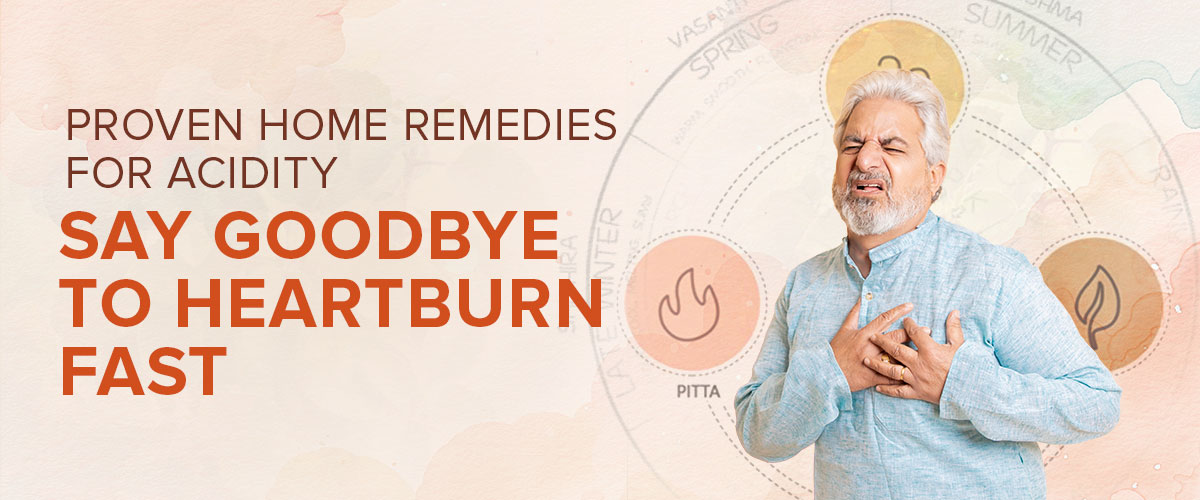Home Remedies for Acidity

Acidity is a common stomach condition where the stomach produces excess acid, causing heartburn, indigestion, and a burning sensation in the throat. It’s an issue that a lot of individuals experience, commonly influenced by lifestyle and diet choices. This condition impacts daily activities & also affects the quality of sleep and overall health.
Home remedies offer a substantial advantage in coping with Acidity because they are all natural, simple to prepare and available at the convenience of your house. Such remedies are particularly appealing as they can treat the discomfort without taking over-the-counter drugs. They involve readily accessible and effective ingredients that are available in nearly every kitchen.
What is Acidity?
Acidity, also called hyperacidity, occurs when the stomach produces excess acid. This condition can lead to a chronic burning sensation in the stomach, heartburn and acid reflux - where stomach contents re-enter the esophagus. It isn't just about the discomfort but Acidity can disrupt everyday life by causing pain which worsens on lying down, impacting sleep and comfort.
Common symptoms of Acidity include burning in the chest or throat, sour belching, or regurgitation of foods or a sour fluid. These symptoms might result in an aversion to food and general discomfort which hinders everyday activities. Individuals showing these Acidity symptoms should be aware they might be dealing with hyperacidity.
What Causes Acidity?
The causes of Acidity consist of internal & external factors which lead to extra production of stomach acid. Knowing these Acidity causes can help individuals deal with and avoid the condition & make educated choices regarding their diet and way of life to manage symptoms.
The primary causes of Acidity are mentioned below :
Dietary Choices: Certain foods and drinks raise stomach acid production. They include:
- Spicy and fatty foods may affect the stomach wall.
- Citrus fruits and tomato based products are acidic.
- Chocolate, onions, garlic, and caffeinated foods can weaken the lower esophageal sphincter and allow acid to exit the stomach.
Eating Habits:
- Consuming big meals or lying down right after eating may pressure the lower esophageal sphincter and cause acid to leak into the esophagus.
- Snacking near bedtime causes nighttime heartburn.
Lifestyle Factors:
- Sedentary habits can result in excess weight and poor digestion which may increase pressure on the stomach and enhance the production of acid.
- Stress and insufficient sleep may also increase acid production and intensify symptoms.
Smoking & Alcohol: Both can relax the lower esophageal sphincter, enabling stomach acid to rise into the esophagus and promoting stomach acid production.
Medications: Certain drugs including pain relievers, antibiotics, and several antidepressants raise Acidity by irritating the stomach wall or relaxing the lower esophageal sphincter.
Health Conditions: Medical conditions like gastroesophageal reflux disease (GERD), stomach ulcers or even a hiatal hernia could also trigger Acidity.
Home Remedies and Tips
Home remedies for Acidity include easy to prepare, natural remedies for soothing the stomach and reducing symptoms. Some of the best home made cures for Acidity are:
Ginger: Ginger is an anti-inflammatory herb whose properties can neutralise Acidity. You can boil pieces of fresh ginger in water for several minutes to create a ginger tea. Consume this tea prior to meals to settle down your stomach and prevent Acidity flare ups.
Tulsi (Holy Basil): Tulsi leaves can balance stomach acids and also soothe acid pain. Chew a few leaves of Tulsi whenever you feel uncomfortable or brew them into a tea. This can calm your stomach and also lower the reflux of acid.
Cold Milk: A glass of cold milk can soothe burning sensations instantly because of its acid-neutralising effect. When you feel uncomfortable, drink some cold milk without sugar. This might stabilise gastric acids and provide relief immediately.
Fennel Seeds (Saunf): Following a meal, eat fennel seeds to balance stomach Acidity. Following meals, chew a teaspoon of fennel seed to help digest food and lessen Acidity symptoms.
Aloe Vera Juice: Aloe vera juice can calm the stomach lining and alleviate acid reflux symptoms. Consume a small cup of aloe vera juice before eating to counterbalance stomach acid production.
Coconut Water: Drinking coconut water creates an alkaline environment which may buffer unnecessary Acidity of the stomach. Consume fresh coconut water two times daily to soothe your stomach and ease acid reflux.
Banana: The natural antacids in bananas may act as a buffer against acid reflux. Having a banana each day can raise your pH and calm your acid reflux.
Buttermilk (Chaas): Lactic acid present in buttermilk normalises Acidity of the stomach. Having a glass of buttermilk with a pinch of black pepper or ground coriander after meals can assist with digestion and Acidity issues.
Cumin Seeds (Jeera): You can also manage Acidity with cumin seeds. Boil a teaspoon of cumin seeds in a cup of water, strain & drink it after meals. This soothes the stomach and also aids in digestion.
Chamomile Tea: Chamomile helps lower stomach acid and relieve gastrointestinal discomfort. Drink chamomile tea once or twice daily between meals to lessen stress and acid symptoms.
Apple Cider Vinegar: Apple cider vinegar is acidic but becomes alkaline after digestion. Mix one tablespoon of apple cider vinegar into a glass of water and drink prior to meals to neutralise the Acidity.
Clove: Chewing on a clove might produce saliva, which lowers stomach acid levels. Keep a few cloves in your pocket and chew gradually after eating to alleviate Acidity.
Jaggery (Gur): Jaggery helps reduce stomach acid. Consuming a small piece of jaggery after meals can cool the stomach & reduce Acidity.
Mint Leaves (Pudina): The leaves of mint can alleviate Acidity and indigestion. Fresh mint leaves may be chewed or infused in tea for acid reflux relief.
Lifestyle and Diet Recommendations
Small changes in lifestyle and diet could affect your Acidity. These adjustments may ease symptoms and promote a healthy digestion. Here are some practical suggestions for lifestyle and dietary modifications for Acidity sufferers:
Diet for Acidity
Eat Smaller, More Frequent Meals: The stomach produces more acid after big meals. Instead, consume smaller portions more frequently to keep stomach acid even.
Stay away from Trigger Foods: Spicy foods, onions, citrus fruits and fatty foods can induce acid production. Restrict these foods and determine other personal triggers to stay clear of.
Boost Alkaline Foods: Consume more apples, melons, cucumbers and oats. These foods neutralise stomach acids.
Keep Hydrated: Drinking sufficient water throughout the day dilutes excess stomach acid and also helps with digestion.
Lifestyle Changes for Acidity
Do Not Lie Down Right After Eating : Give your body time to digest. Remain upright for a minimum of 3 hours following meals. This prevents backflow of stomach acid.
Quit Smoking & Limit Alcohol: Both smoking and alcohol consumption could raise Acidity by relaxing the lower esophageal sphincter and irritating the stomach wall.
Handle Stress: Stress may induce production of stomach acid. Techniques such as meditation, yoga or regular exercise may ease stress.
Improve Your Sleep Habits: Avoid eating before bedtime and elevate your head while sleeping to stay away from acid reflux at night.
Recommended Routine Changes
Regular Exercise: Moderate exercise can improve digestion and also lower stress, which might help with Acidity.
Chew Your Food Well: Slowly chewing food can help with digestion and reduce the workload on your stomach.
FAQs
1. What is the home remedy for acidity?
The quick home remedy for acidity is to chew a piece of fresh ginger or drink ginger tea. Ginger balances your stomach acids and soothes digestion. You can also mix a spoon of jeera (cumin) in warm water and sip it slowly. Avoid lying down after eating and make sure your meals are light.
2. What are the home remedies for acid reflux?
For acid reflux, chew fennel seeds after meals or drink a glass of cold milk. Have a spoon of honey with some warm water before bed too. Avoid spicy, oily and sour foods. Eating small, frequent meals and staying upright for a while after eating can also help reduce the burning sensation.
3. What foods reduce acidity?
Foods like bananas, oats, boiled vegetables, cucumbers, coconut and cold milk lower acidity. These are cooling, non-spicy, and easy for your stomach to digest. Avoid fried, sour and spicy foods. Also avoid raw onions, tomatoes and pickles during an acidity episode. Eat slowly and chew your food thoroughly.
4. What should I drink for acidity?
Drinks like cold milk, coconut water, buttermilk, or jeera (cumin) water help with acidity. These calm the stomach lining and relieve burning. Herbal teas like ginger or chamomile tea help too. Avoid coffee, tea, soft drinks and citrus juices as they can worsen your condition.
5. How can I get immediate relief from acidity?
Drink a glass of cold milk or eat a spoon of saunf (fennel) water for fast relief. A mix of baking soda and water (just a pinch in half a glass) also gives instant relief. You can also chew tulsi leaves to settle your stomach. Avoid overeating and acidic foods.
6. Does walking reduce acidity?
Yes, a light walk after meals helps your body digest food and prevents acid from rising up the food pipe. Walking speeds up your metabolism, decreases bloating and supports better stomach movement. Even a 10-15 minute stroll counts. Avoid lying down immediately after eating to avoid reflux.
7. How to sleep when you have reflux?
If you have reflux, sleep on your left side and keep your head slightly elevated with an extra pillow. This position prevents stomach acid from flowing back into the food pipe. Avoid eating at least 2–3 hours before bedtime. You can also drink some cold milk before you sleep for relief.



 Prev
Prev





















































































































































